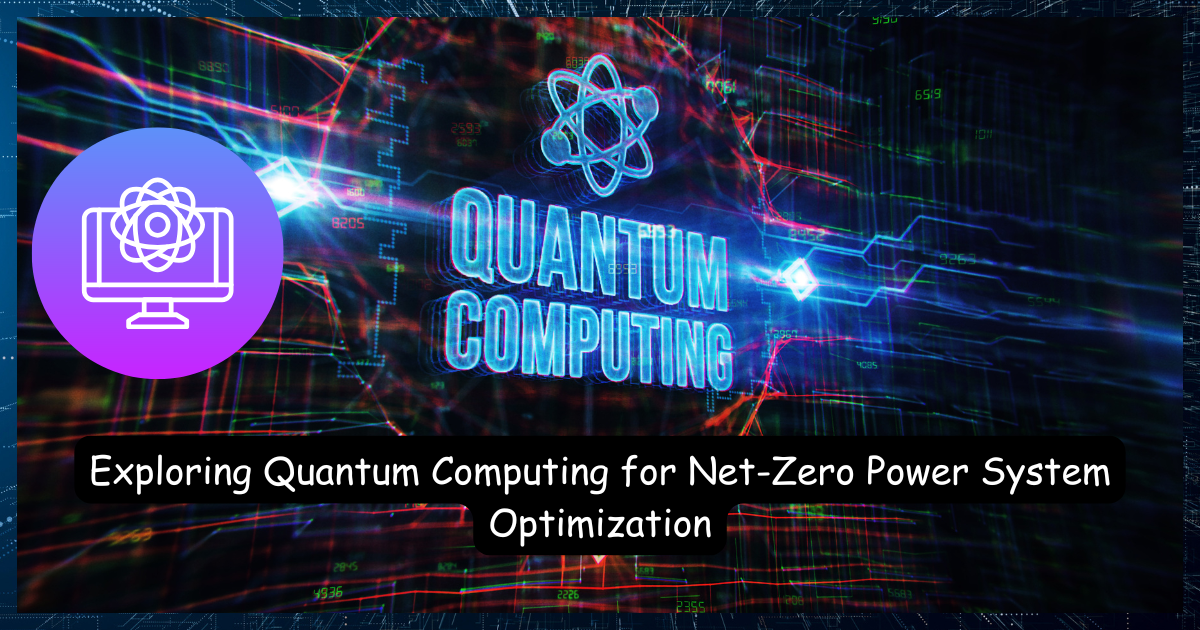Exploring Quantum Computing for Net-Zero Power System Optimization: In the context of IE, QC can revolutionize areas such as optimization, manufacturing process simulations, and energy-efficient production systems. Breakthroughs in quantum convex optimization and ML could provide innovative solutions to challenges in power system planning and operation.
Exploring Quantum Computing for Net-Zero Power System Optimization
QNNs have shown promise in enhancing decentralised energy systems` ability to respond to fluctuating renewable energy input. Improving operational flexibility and efficiency. The Synergy between quantum computing and ML also offers new avenues for optimisations in highly dynamic environments.

What is Quantum Computing?
The field of quantum computing contains a range of disciplines, including quantum hardware and quantum algorithms. While still in development, quantum technology will soon be able to solve fast enough. By taking advantage of quantum physics, fully realized quantum computers would be able to process massively complicated problems at an order of magnitude faster than modern machines.
Four key principles of quantum mechanics
- Superposition
- Entanglement
- Decoherence
- Interference
What is a Net Zero Power System?
Net Zero means that any carbon emissions created are balanced by taking the same amount out of the atmosphere. So we`ll reach net Zero when the amount of carbon emissions we add is no more than the amount taken away.
Opportunities for Quantum Computing for Net-Zero Power System Optimization
Context & Scale
In this review, we identify significant and wide-ranging opportunities for recent breakthroughs in quantum accelerated optimization to offer value for the transition to net-zero power systems. These opportunities span a variety of problems across planning and operation, which are key for reliable and affordable decarbonization.
Seminal Discoveries highlighted in the review: We review the latest work on quantum computing for combinatorial power system optimization applications, including unit commitment, grid-edge flexibility coordination and network expansion and network expansions where planning.
Highlights
- Quantum computing offers opportunities for optimal net-zero power system planning and operation
- Quantum computing can enable faster, larger-scale, and higher fidelity optimization
- Opportunities across simulation-based, combinatorial, convex and ML-Bases approaches
- Opportunity for near-term impact with domain-specific NISQ devices.
Introduction
Electric power system decarbonization is a core component of the global transition to net Zero requiring major infrastructure investments in renewable generation, and grid energy storage. and transmission infrastructure, along with the rapid adoption of electric transport and heating.
A core underlying method for power systems is the optimal power flow problem, which considers how a set of generators should be dispatched to meet demand at the lowest cost while respecting technical constraints such as generator power ratings, line current flow limits, and bus voltage limits.
Opportunities from quantum computing
The computational challenges discussed so far have been considered from a classical computing perspective, where the operation of physical computing hardware is designed to support reliable logical operations and enable higher levels of abstraction and programming. Quantum computers are designed to make use of quantum information and quantum mechanical phenomena, such as superposition entanglement, and adiabatic evolution.
There are currently two main models of quantum computing
- Gate-based
- quantum annealing
Quantum simulation-based optimization
Simulation-based optimization covers a range of approaches where an optimal solution is found by simulating a system for many potential decision variable configurations. Dynamic programming provides a systematic approach for finding the exact solution for multi-time interval discrete optimization problems using Bellman`s equation and recursive value calculations for various combinations of state and decision variables.
Quantum combinatorial optimization
So far, most work on quantum computing for power system optimization has focused on combinatorial problems and presents an overview of relevant design patterns.
QA for optimal UC is demonstrated in Ajagekar metal. with minimum turn-on powers and start-up costs but without network constraints. There are several important coverts to the broad applicability of QA Errors are introduced into existing hardware due to issues such as flux noise and digital analogue quantization error.
Quantum convex optimization
Convex optimization involves minimizing a convex objective function with a convex set of decision variables. Using linear power flow approximations, the OPF Problem can be formulated as an LP or QP depending on the cost function.
Conclusion
Our view has found a variety of quantum computing algorithms with potential applications for net-zero power system operation and planning. The most developed area is the use of quantum computing for combinatorial problems.
